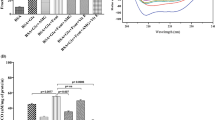Abstract
Glycation is common posttranslational modification of proteins impairing their function, which occurs during diabetes mellitus and aging. Beside extracellular glycation of long-lived proteins, intracellular modifications of short-lived proteins by more reactive sugars like fructose are possible. The process includes free oxygen radicals (glycoxidation). In an attempt to reduce glycoxidation and formation of advanced glycation products (AGE), influence of 0.2–1.2 mM uric acid as endogenous antioxidant on glycoxidation of purified pig heart aspartate aminotransferase (AST) by 50 mM and 500 mM D-fructose in vitro was studied. Uric acid at 1.2 mM concentration reduced AST activity decrease and formation of total AGE products caused by incubation in vitro of the enzyme with sugar up to 25 days at 37 °C. The results thus support the hypothesis that uric acid has beneficial effects in controlling protein glycoxidation. The in vitro system AST-fructose proved to be a useful tool for investigation of glycation process. (Mol Cell Biochem 278: 85–92, 2005)
Similar content being viewed by others
References
Nagaraj RH, Sell DR, Prabhakaram M, Ortwerth BJ, Monnier VM: High correlation between pentosidine protein crosslinks and pigmentation implicates ascorbate oxidation in human lens senescence and cataractogenesis. Proc Natl Acad Sci USA 88: 10257–10261, 1991
Hamelin M, Borot-Laloi C, Friguet B, Bakala H: Increased level of glycoxidation product N(epsilon)-(carboxymethyl)lysine in rat serum and urine proteins with aging: link with glycoxidative damage accumulation in kidney. Arch Biochem Biophys 411: 215–222, 2003
Giardino I, Edelstein D, Brownlee M: Nonenzymatic glycosylation in vitro and in bovine endothelial cells alters basic fibroblast growth factor activity. A model for intracellular glycosylation in diabetes. J Clin Invest 94: 110–117, 1994
Shinohara M, Thornalley PJ, Giardino I, Beisswenger P, Thorpe SR, Onorato J, Brownlee M: Overexpression of glyoxalase-I in bovine endothelial cells inhibits intracellular advanced glycation endproduct formation and prevents hyperglycemia-induced increases in macromolecular endocytosis. J Clin Invest 101: 1142–1147, 1998
Vlassara H, Brownlee M, Cerami A: Nonenzymatic glycosylation: role in the pathogenesis of diabetic complications. Clin Chem 32: B37–B41, 1986
Sell DR, Monnier VM: Isolation, purification and partial characterization of novel fluorophores from aging human insoluble collagen-rich tissue. Connect Tissue Res 19: 77–92, 1989
Fu MX, Wells-Knecht KJ, Blackledge JA, Lyons TJ, Thorpe SR, Baynes JW: Glycation, glycoxidation, and cross-linking of collagen by glucose. Kinetics, mechanisms, and inhibition of late stages of the Maillard reaction. Diabetes 43: 676–683, 1994
Price DL, Rhett PM, Thorpe SR, Baynes JW: Chelating activity of advanced glycation end-product inhibitors. J Biol Chem 276: 48967–48972, 2001
Sobal G, Menzel J: The role of antioxidants in the long-term glycation of low density lipoprotein and its Cu2+-catalyzed oxidation. Free Radic Res 32: 439–449, 2000
Becker BF: Towards the physiological function of uric acid. Free Radic Biol Med 14: 615–631, 1993
Davies KJ, Sevanian A, Muakkassah-Kelly SF, Hochstein P: Uric acid-iron ion complexes. A new aspect of the antioxidant functions of uric acid. Biochem J 235: 747–754, 1986
Drsata J, Beranek M, Palicka V: Inhibition of aspartate aminotransferase by glycation in vitro under various conditions. J Enzyme Inhib Med Chem 17: 31–36, 2002
Okada M, Murakami Y, Miyamoto E: Glycation and inactivation of aspartate aminotransferase in diabetic rat tissues. J Nutr Sci Vitaminol 43: 463–469, 1997
Okada M, Sogo A, Ohnishi N: Influences of some low molecular compounds on enzymatic activity and isoelectric point of aspartate aminotransferase from rat liver. J Nutr Biochem 5: 485–489, 1994
Suarez G, Rajaram R, Oronsky AL, Gawinowicz MA: Nonenzymatic glycation of bovine serum albumin by fructose (fructation). Comparison with the Maillard reaction initiated by glucose. J Biol Chem 264: 3674–3679, 1989
Fitzgerald C, Swearengin TA, Yeargans G, McWhorter D, Cucchetti B, Seidler NW: Non-enzymatic glycosylation (or glycation) and inhibition of the pig heart cytosolic aspartate aminotransferase by glyceraldehyde 3-phosphate. J Enzyme Inhibition 15: 79–89, 1999
Kanellis J, Kang DH: Uric acid as a mediator of endothelial dysfunction, iflammation, and vascular disease. Semin Nephrol 25: 39–42, 2005
Wolff SP, Dean RT: Glucose autoxidation and protein modification. The potential role of ‘autoxidative glycosylation’ in diabetes. Biochem J 245: 243–250, 1987
Hodge JE: Dehydrated foods, chemistry of browning reactions in model systems. J Agric Food Chem 1: 928–943, 1953
Thorpe SR, Baynes JW: Maillard reaction products in tissue proteins: new products and new perspectives. Amino Acids 5: 275–281, 2003
Author information
Authors and Affiliations
Corresponding author
Rights and permissions
About this article
Cite this article
Boušová, I., Bakala, H., Chudáček, R. et al. Glycation-induced inactivation of aspartate aminotransferase, effect of uric acid. Mol Cell Biochem 278, 85–92 (2005). https://doi.org/10.1007/s11010-005-6933-0
Received:
Accepted:
Issue Date:
DOI: https://doi.org/10.1007/s11010-005-6933-0




